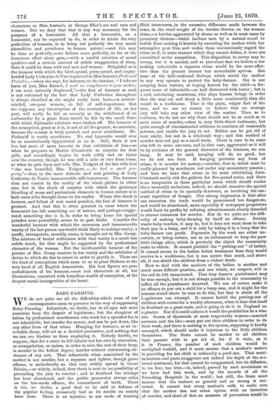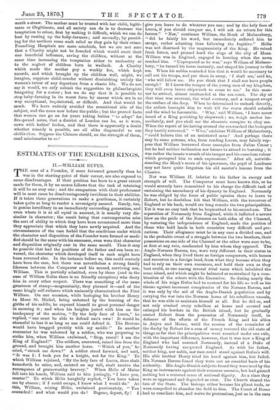BABY-FARMING.
N1TE do not quite see all the difficulties which some of our
contemporaries seem to perceive in the way of suppressing Baby-Farming. Infanticide, no doubt, has in all ages and most countries been the despair of legislators ; but the slaughter of babies by professional murderesses who work for a specified fee is not infanticide, but murder for money, and can be put down, like any other form of that crime. Hanging, for instance, as an in- evitable doom, will act as a decided preventive, and nothing that we can see hinders us from employing it. Nobody doubts, we suppose, that for a nurse to kill infants not her own by starvation, or strangulation, or opium, in order to save the cost of their keep, is murder in the fullest degree, murder without extenuating cir- stances of any sort. That infanticide when committed by the mother is not murder, but a separate and lighter, though grave offence, is undoubtedly an idea very widely spread in Great Britain,—so widely, indeed, that there is next to no possibility of persuading the jury to convict ; and in Scotland the attempt has been abandoned, and the public prosecutor always relies on the law-made offence, the concealment of birth. There is too, no doubt, a good deal to be said in defence of the popular feeling, excessively bad as its results on society have been. There is an injustice in our mode of treating illicit intercourse, in the excessive difference made between the sexes, in the cruel weight of the burden thrown on the woman alone,—a burden aggravated by shame as well as in most cases by pecuniary distress—which inclines men by a natural recoil to shrink from making it heavier by executing the mother while her accomplice goes free, and makes them unconsciously regard the crime as if, in some manner which they cannot define, it were one committed under compulsion. This disposition to mercy may be wrong, but it is natural, and so prevalent that we believe a law making infanticide a separate crime would be far more effec- tive than the present sterner but unworkable system. But none of the half-confessed feelings which shield the mother in any way operate to protect the baby-farmer. She is not escaping from torture, or hoping heaven for the child—a fre- quent cause of infanticide—or half distracted with terror ; but is a cool, calculating murderess, who slays human beings, in order that she may eat and drink a little more comfortably than she would in a workhouse. That is the plain, vulgar fact of the case, and we see no reason to believe that an average jury will take any other view of the matter. Then as to evidence, we do not see why there should not be as much as in most cases of murder,--that is, very little direct testimony, but quite enough of circumstantial evidence to convince all reasonable persons, and enable the jury to act. Babies can be got rid of very easily, but not in a wholesale way ; and this method of murder does not pay as a retail trade. There is sure to be some clue left in some one case, and in that case, aggravated as it will be by evidence of the general character of the business, we can hang. It may be said, hanging will do no good, but we do not see that. If hanging prevents any form of crime, it is murder for money,—murder, that is, which must be coolly planned by murderers not under any momentary passion ; and here we have that crime in its most calculating form. Criminals rarely risk the gallows for five-pound notes, and there is no temptation in these particular notes which should render them unusually audacious, indeed, we should conceive the special method of crime to be specially deterrent, as involving the con- stant repetition of danger. Our strong impression is that after one execution the trade would be pronounced too dangerous, and would be abandoned, more especially if newspaper proprietors would limit its profits by refusing advertisements clearly intended to attract customers for murder. Nor do we quite see the diffi- culty of making baby-farming by itself an offence. Society wants baby-tenders, it may be, but it does not want them to take their pay in a lump, and it is only by taking it in a lump that the baby-farmer can profit. Payments by the week are either un- certain, or being certain, act as an inducement to keep the poor little things alive, which is precisely the object the community seeks to obtain. It cannot prohibit the " putting-out " of babies. It cannot secure to the babies better treatment than they would receive in a workhouse, but it can secure that much, and above all, it can shield the children from a violent death.
How to deal with the mothers of the babies is another and much more difficult question, and one which, we suspect, will in the end be left unanswered. That they deserve punishment may be true enough, but it is not always possible to the community to inflict all the punishment deserved. We can of course make it an offence to put out a child for a lump sum, and it might for the reasons stated above be wise to do this, but that is about all the Legislature can attempt. It cannot forbid the putting-out of children with nurses for a weekly allowance, when it does that itself in Scotland on a great scale, and is going to do it in England on a greater. Nor if it could enforce it would the prohibition be a wise one. Scores of thousands of most respectable women—married servants and the like—must put out their children in order to do their work, and there is nothing in the system, supposing it kindly managed, which should make it injurious to the little children themselves. The State cannot be mother to all children their parents wish to get rid of, for if it were, as it is in France, the number of such children would be multiplied tenfold, and it must assume that a mother's motive in providing for her child is ordinarily a good one. That senti- mentalists and poets exaggerate not indeed the depth of the ma- ternal sentiment, for that cannot be exaggerated, but its diffusion, is, we fear, too true,—is, indeed, proved by such revelations as we have had this week, and by the records of all the Foundling Hospitals in the world ; but still, the State must assume that the instinct so general and so strong is uni- versal. It cannot test every mother's milk to make sure that the mother has not eaten opium with an intention of murder, and short of that no measure of prevention would be worth a straw. The mother must be trusted with her child, legiti- mate or illegitimate, and all society can do is to decrease the temptation to crime, first by making it difficult, which we can do best by rooting up the baby-farmers ; and secondly, by provid- ing for the mothers some such relief as they gain by their crime. Foundling Hospitals are mere mischiefs, but we are not sure that a Charity might not be founded which would exert their one beneficial influence, saving the children, without at the same time increasing the temptation either to unchastity or
to the neglect of children born in wedlock. A Charity which made the mother pay a weekly fee, which kept records, and which brought up the children well, might, we imagine, suppress child-murder without diminishing unduly the women's terror of any departure from a chaste life. We do not say it would, we only submit the suggestion to philanthropists hungering for a career ; but we do say that it is possible to stop baby-farming in its worst form by means which are in no way exceptional, inquisitorial, or difficult. And that would be much. We have entirely avoided the sensational side of the subject, and the cases now before the public ; but the proved facts that women can go on for years taking babies " to adopt" for Eve-pound notes, that a district of London can be, as it were, sown with babies' bodies, and that there is apparently a doubt whether remedy is possible, are all alike disgraceful to our civilization. Suppose the Chinese should, on the strength of them, send missionaries to us?





























 Previous page
Previous page